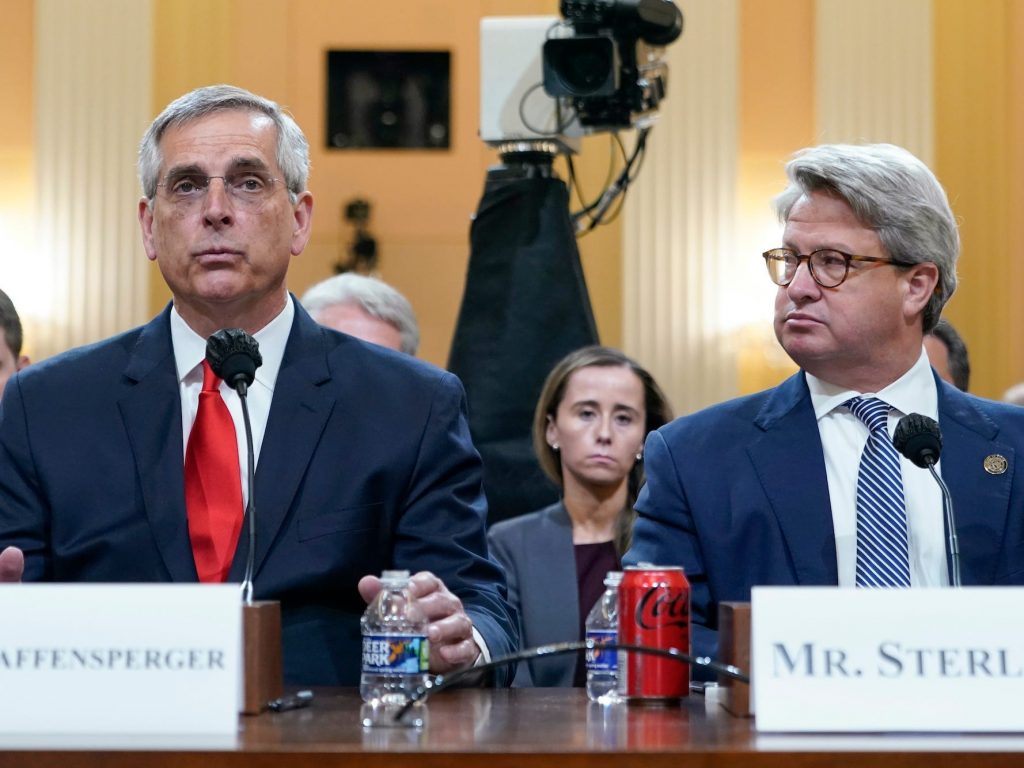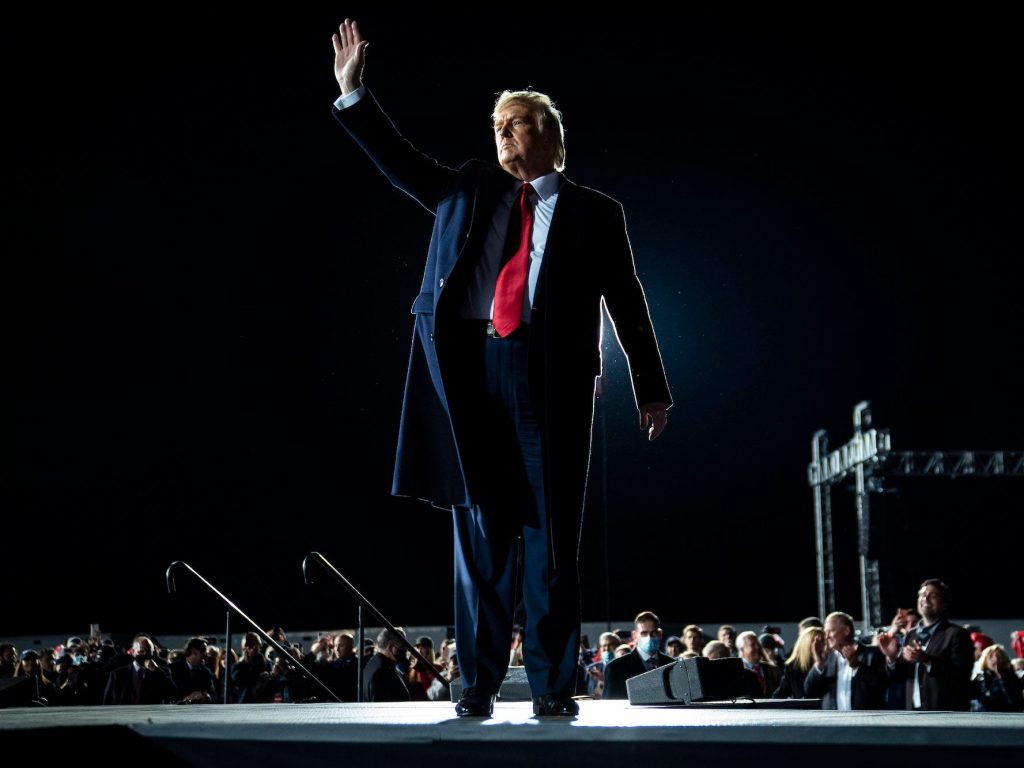- The Fulton County investigation into Trump is ramping up.
- Legal experts point to three Georgia laws Trump may have broken.
- The Georgia investigation into Trump is the most urgent legal challenge against him, experts say.
Soon after Fani Willis started in her job as Fulton County district attorney back in February 2021, she announced that she would take on an investigation of historic proportions — scrutinizing Donald Trump.
Now nearly a year and a half later, Willis appears to be ramping up her local criminal investigation into the former Republican president and his associates' possible interference in Georgia's results from the 2020 presidential election. On July 5, the Fulton County special grand jury issued subpoenas to members of Trump's inner circle, including his personal attorney Rudy Giuliani, his legal adviser John Eastman, and Republican Sen. Lindsey Graham of South Carolina.
The latest development signals that Willis is getting closer to gathering the evidence she needs to decide whether to charge Trump, according to several legal experts who spoke with Insider.
When Willis first announced her investigation into the former president, she said it would focus on Trump and his associates' attempts to pressure Georgia state officials to overturn the state's 2020 election results. Since then, the investigation has expanded to examine an alleged scheme to have a fake slate of electors certify the election results so that Trump won in Georgia instead of the man who actually did, Joe Biden, according to a recent subpoena for Kenneth Chesebro, a legal advisor to Trump.
Legal experts told Insider that the Georgia investigation into Trump could be the most pressing legal challenge against him. The House select committee investigating the January 6 insurrection has also put more focus on Trump's efforts to interfere with the state's results from the 2020 presidential election after Georgia Secretary of State Brad Raffensperger testified before the committee and recalled how Trump pressured him to find more votes to overturn the election results.
"The January 6 hearings are accelerating the evidence that she needs to charge the former president," Norm Eisen, a former advisor to House Democrats during their 2019-2020 impeachment of Trump, said of Willis. "They're providing her with additional proof of the offenses."
John Dean, the White House counsel for former President Richard Nixon whose public testimony played a critical role in unraveling the Watergate scandal, told Insider that the public has now seen evidence "that would indicate that (Trump) has a lot of reasons to be worried."
But others like Alan Dershowitz, who was a part of Trump's defense team during his first impeachment trial, feel differently about Willis's investigation into Trump. Dershowitz told Insider that the process in which Willis is conducting her investigation is "deeply flawed."
"Usually, what happens is a crime is committed, and then you try to find the person," he said. "Here, it is the opposite. People are looking to try to find a crime. Maybe they'll find one. It's possible, but I think the process is extremely dangerous."
Trump's attorney Justin Clark did not respond to Insider's request to comment on the Georgia investigation.
Four legal experts spoke to Insider on the possible Georgia laws Trump may have broken that could potentially bolster Willis' case against him.
Racketeering
Last March, Willis hired John Floyd, an expert in racketeering cases, to assist in her investigation into Trump. Floyd wrote a book on prosecuting state racketeering cases called "RICO State By State: A Guide to Litigation Under the State Racketeering Statutes."
Typically, racketeering charges are associated with criminal mobs or gang organizations. But it also can be applied to a group of individuals who commit crimes through extortion or coercion. Under Georgia law, this offense carries a minimum prison sentence of at least five years.
Willis also has experience prosecuting these kinds of cases. As a Fulton County assistant district attorney, she worked on a high-profile case involving several Atlanta public school teachers who were accused of conspiring to change their student's standardized test scores answers. In 2015, 11 of the 12 school educators were convicted on racketeering charges.
As the local DA, Willis could use the evidence of Trump's calls with Georgia election officials to bolster her potential case against him, said Nick Akerman, a former federal prosecutor who also worked on the Watergate prosecution team.
For instance, on December 23, 2020, Trump called Frances Watson, who served as a chief investigator of the investigations division for the Georgia Secretary of State, where he urged her to find election fraud. A few days later, on January 2, 2021, Trump called Raffensperger and pressured him to find more votes to overturn the election results.
"It's the strongest case they have against Trump," Akerman said. "You have two great witnesses: Raffensperger and (Republican Georgia Governor Brian) Kemp. And you've got Trump calling the chief investigator in Georgia. I mean, the evidence there is just pretty overwhelming."

Election fraud solicitation
Willis could potentially charge Trump with election fraud solicitation by using the phone calls he made to Raffensperger and Watson as evidence to support her claims. She can also point to the evidence she has gathered on Trump's alleged scheme to send a fake slate of electors to overturn Georgia's election results, legal experts told Insider.
"The evidence that we have about Donald Trump's demand for the phony votes and the phony electoral certificate, I mean, that fits Georgia's solicitation of election fraud, like a hand in glove," Eisen told Insider.
But her biggest challenge would be proving that Trump knew he was committing election fraud when he made these calls to the Georgia officials, said Peter Odom, a former Fulton County prosecutor.
"With fraud cases, you have to show that someone knew that what they were doing was fraudulent," Odom, who has previously worked on these kind of cases, told Insider.
Odom added that Trump's possible legal defense could be that he didn't have an intent to commit a crime because he believed there was election fraud.
"If he actually thought he won and he was trying to get people to promote his victory, one could argue that he didn't have the intent to have people commit a crime. He had the intent to have people get to the truth," he said.
But prosecutors on Willis's team could point to the number of White House legal advisers and Justice Department officials who told Trump they found no evidence to support the notion that the election was rigged.
Some DOJ officials, like former Attorney General William Barr, have already testified before the House select committee about his conversations with Trump and how he informed him that there was no election fraud. Barr's testimony to the House select committee was later displayed during several of the committee's public hearings.
Interference with performance of election duties
Willis could also potentially charge Trump with the crime of interfering with the performance of election duties.
Prosecutors would have to prove beyond a reasonable doubt that Trump intentionally interfered or attempted to delay the performance of an official government proceeding. Her team could point to the calls Trump made to Raffensperger and Watson and claim that he made these calls with the intent to delay them from carrying out their election duties," legal experts say.
Odom told Insider that if Willis charged these crimes against Trump, she would have to prove that the former president knowingly tried to commit them.
"The hardest thing to prove in a case like this is the intent of the individual that is committing that crime," he said. "You have to show that someone did something purposely…or that they did something with reckless disregard."
